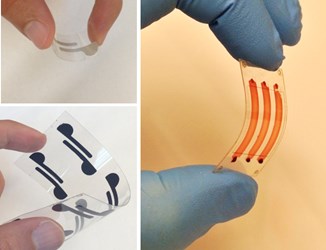Paper-Based Biosensors Can Diagnose HIV, E. Coli, And Staph Infections

Scientists have developed a new biosensing platform that can remotely diagnose infections such as HIV, Escherichia coli coli, Staphylococcus aureus, and other bacterial infections. The paper-based platform is cost-effective and simple to use, making it ideal for a number of applications including point-of-care (POC) diagnostics in low-income countries.
According a study published in Nature by a team from Florida Atlantic University (FAU), Stanford University, and Harvard University, paper and flexible material-based platforms offer a number of design advantages. The raw materials are available anywhere in the world, so they are easy to fabricate and mass-produce. Because they can be incinerated, the platforms are safely and conveniently disposable.
“Paper and flexible material-based platform technologies have created an exciting avenue in the area of POC diagnostics. These technologies also have potential to shift the paradigm in developing diagnostic assays,” said the authors of the study.
Despite its advantages, paper does present some challenges for biosensing. Researchers said that existing paper and flexible material-based platforms use colorimetric, fluorometric, and electrochemical approaches that “require complex labeling steps to amplify the signal.” These methods also depend on advanced laboratory infrastructure that is not always readily available.
The researchers designed their platforms to use electrical and optical sensing mechanisms such as impendance spectroscopy, nanoparticle aggregation, and lensless shadow imaging technology, which all require fewer steps.
The resulting device, made from cellulose paper and polyester material, is flexible, lightweight, and can accurately detect a variety of biotargets from a several different kinds of biofluid samples. The images collected POC from a single drop of blood can be transmitted and analyzed remotely.
In the study, researchers demonstrated accurate and sensitive results using the platforms to detect antibody biomarkers of HIV, E. coli, and S. aureus in samples of whole blood, plasma, and peritoneal fluid.
“Our paper microchip technologies can potentially have a significant impact on infectious disease management in low-and middle-income countries where there is limited laboratory infrastructure,” Hadi Shafiee, medical instructor at Brigham and Women’s Hospital at Harvard Medical School and co-first author of the study, said in a press release.
Utkan Demirci, senior author from Stanford School of Medicine, said that the platforms could easily be tailored to detect other diseases that possess well known biomarkers.
“The future of diagnostics and health monitoring will have potentially cell-phone based or portable readers sipping saliva or blood and continuously monitoring human health, taking it way beyond where we are now with counting steps today,” he said.
Image credit: Florida Atlantic University
